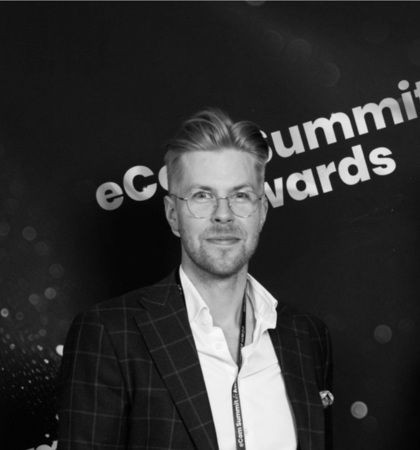My first 100 days as an entrepreneur: Building a retail CRM consultancy from scratch
From our blog / Article
The journey from an employed professional to founder is rarely straightforward. Mine certainly wasn't. After a decade in retail software sales, witnessing the same problems plague company after company, I finally reached that turning point every entrepreneur faces: the realization that I could build something, to solve these problems better myself.
Author

The shift
My career began conventionally enough—studying law and business, working at a bank, following a more traditional path. But technology’s pull proved irresistible. What started as curiosity about all things digital and e-commerce, quickly evolved into a fascination with consumer behavior and digital purchasing patterns.
This interest propelled me into a decade-long journey through retail software sales. Across hundreds of technology evaluations, I gained a comprehensive view of the retail landscape, eventually leading the market entry of a Nordic CRM vendor. Throughout this experience, Five persistent problems emerged:
- Technology Alone Doesn’t Solve Problems.
Many merchants believe implementing new tools is enough, but marketing and e-commerce teams are often understaffed and overwhelmed. Without ongoing strategy and effort beyond the initial rollout, technology investments fail to deliver real results. - Customer Data Remains Largely Untapped and Unusable.
Retailers collect extensive first-party data but struggle to convert it into actionable insights. The consequence is generic campaigns, guesswork-driven strategies, and fragmented customer experiences. - Data Usability Is the Real Barrier.
It’s not about the volume of data but its usability. Data is often siloed, poorly integrated, or lacks trust within teams, preventing it from informing decisions or driving meaningful action. - Personalization Is the New Standard—Yet Rarely Delivered.
Every business decision—from messaging to product assortment—should be guided by data. Yet, most retailers still rely on instinct instead of insight, falling short of consumer expectations for relevant and personalized experiences. - Loyalty Programs Often Lack Foundation and Impact.
While loyalty programs are widely promoted, many companies fail to execute them effectively. True loyalty stems from strong business fundamentals, and without that, investing in formal programs yields limited results.
Taking the leap
January marked the beginning of my entrepreneurial chapter. Initially envisioning a broader consultancy, I quickly narrowed the focus to the specific data and tech problems I knew merchants desperately needed help solving. The CRM space has plenty of players, but based on my experience, there was clearly room for a consultancy that actually delivered results and connected business and technology fluently.
My first plan was to bootstrap an agency as a solo consultant. LinkedIn became my hunting ground as I searched for freelancers and recently laid-off talent. Nearly 100 conversations later, I had identified a promising 10% who matched my standards for skills and personality. These conversations doubled as market research, providing valuable feedback on my concept.

Building the foundation
Before formally establishing the company, I tackled the fundamentals. Website development proved challenging (I’m no designer), but I pushed through, packaging services and studying competitors. One early strategic decision: Finland alone was too small a market. We needed to target at least the Nordic region, maybe broader.
Then came the technology question: should we be agnostic or committed to specific platforms? Enterprise or small business focused? I thought of the Swedish concept I learnt of “Lagom”—not too little, not too much. We would focus on mid-market consumer brands clients, avoiding both the smallest players and enterprise giants, setting the range from 10 million to 1 billion in revenue.
Cold-calling technology vendors worldwide proved surprisingly productive. Most were receptive, and many validated my business concept—a full-service CRM consultancy focused on B2C clients. Partnership agreements followed, despite not having formally established my company yet.
Reality check
Pitching to my professional network was harder than expected. The competitive landscape revealed itself: performance marketing agencies and niche email or automation consultancies were already offering fragments of my service portfolio.
Nevertheless, meaningful conversations led to potential deals. The emerging revenue stream demanded action—I finally needed to formalize the business.
The ecosystem advantage
A lunch with a brand executive introduced me to Reaktor’s ecosystem.
Soon, our pitch call revealed natural alignment, accelerating our momentum and opening doors to funding and access.
The ecosystem partners suggested bringing on co-founders to speed up growth and diversify our skill set. After evaluating candidates from my earlier networking, I found many weren’t willing to leave secure, well-paying positions for startup uncertainty, or didn’t have the right kind of drive to go all in.
Then came Robin. With over a decade of experience in CRM and building high-performing teams, his deep subject knowledge and winning mindset were exactly what I was looking for—making the entrepreneurial risk a non-issue. Two weeks later, we formalized Avenyo at Reaktor’s office.
A few weeks after that, Jonas joined us. Also with over a decade of experience, he has a brilliant e-commerce CTO background and a strong track record of extracting value from retail technology systems. Together, they perfectly complement our skill set with expertise in CRM, data, and strategic execution.
The initial momentum
Just a few weeks into operations, we’ve already secured our first contracts, onboarded multiple partners worldwide, and hired our first consultants who will be starting with clients soon. Market feedback has been strongly positive—we’re addressing a growing need at precisely the right time.
The data driven retail CRM and personalization space isn’t just maintaining relevance; it’s accelerating. As first-party data becomes increasingly crucial, our expertise sits at the intersection of several converging trends.
Looking back at these first 100 days—from concept to first clients—I’m reminded that entrepreneurship is about calculated risk-taking and positioning. It’s about recognizing patterns from past experiences and having the courage to build solutions when others see only problems.
The journey continues, but one thing is clear: when expertise meets timing and good execution, even crowded markets offer room for newcomers who truly solve customer problems.
Avenyo is the strategic partner for consumer brands ready to turn data into growth. They cut through complexity—transforming fragmented systems and siloed insights into clear, actionable strategies. From customer intelligence to personalized marketing and CRM-driven revenue, they deliver the data clarity, commercial strategy, and hands-on execution needed to unlock meaningful, measurable impact.
About the Author
Niko is the CEO & Founder of Avenyo. He is a results-driven leader specializing in data optimization and transformation. With extensive expertise in solution sales within the retail and ecommerce industry, he has engaged in hundreds of technology projects while leading market entries for software vendors. His deep understanding of omnichannel retail and customer relationships is rooted in this comprehensive experience, combined with a healthy obsession for consumer behavior. This unique perspective positions him to help businesses where strategy leads and technology serves. Passionate about putting data in the driver's seat, Niko excels in guiding organizations through transformations that prioritize strategic goals over technological complexity, ensuring that solutions deliver measurable growth and enhanced customer experiences.
Want to know more?
Connect with us.




